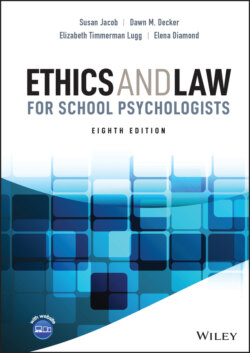Читать книгу Ethics and Law for School Psychologists - Susan Jacob - Страница 11
EIGHTH EDITION REVISIONS
ОглавлениеThere have been a number of changes in ethical guidelines and law since we completed work on the seventh edition of this text. The National Association of School Psychologists (NASP) revised its professional standards, including the Principles for Professional Ethics, in 2020, and the American Psychological Association revised its ethics code, Ethical Principles of Psychologists and Code of Conduct, in 2016 ([APA], 2017b). In the past several years, court rulings have provided new legal guidance on several issues of importance to school psychologists. For example, the US Supreme Court decision in Endrew v. Douglas County School District (2017) clarified interpretation of the meaning of a free and appropriate education under the Individuals with Disabilities Education Act as amended in 2004 (IDEA). The Supreme Court decision in Fry v. Napoleon Community Schools (2017) clarified that a student who has an individualized education program (IEP) under IDEA may have additional rights and protections under Americans with Disabilities Act as amended in 2008 that must be respected by the school.
The eighth edition of Ethics and Law for School Psychologists gives new attention to the ethical obligation to promote social justice. The problem-solving model that appeared in previous editions of the book was replaced by a new model developed by Diamond et al. (2021) that emphasizes socially just practice. Overall, the book has been updated to stress consideration of racial, ethnic, socioeconomic, and other background factors important to understanding the context and/or the individuals involved in ethically challenging situations (e.g., APA, 2017a), and practitioners are now more explicitly urged to examine their own biases and how those biases might affect their perception of a situation and professional judgment. Chapter 8 now includes information about working with students who have undocumented family members and the educational rights of homeless schoolchildren. While all chapters were revised with an eye toward including relevant content on social justice, Chapter 12 (new) now provides an expanded focus on advocacy.
The previous edition of Ethics and Law for School Psychologists included new material on ethical-legal considerations associated with the use of digital technologies by school districts, school psychologists, and school children. Since that time, the Covid-19 pandemic along with the nationwide shortage of school psychologists have led to increased interest in distance assessment and intervention. As a result, multiple sections of the book were further updated to address ethical and legal concerns associated with distance delivery of school psychological services, including sections on distance assessment (Chapter 6), teleconsultation (Chapter 8), and telesupervision (Chapter 11).
Throughout the eighth edition, we incorporated citations to recent publications and legal decisions. However, we also continued to cite older works that provided the foundation for more recent scholarship in the area of ethics and law for school psychologists. As Koocher and Keith-Spiegel (2008) observed, ignoring important older publications on a topic is disrespectful of the efforts of early scholars. Furthermore, researchers and writers “who pass over earlier work may conclude that they discovered something fresh and innovative when in fact the same findings were published many years ago” (p. 524).
To assist the reader, a list of acronyms that are frequently used in this volume appears in Appendix E. An updated instructor’s manual with test questions and Microsoft PowerPoint slides are available for trainers who adopt the textbook. These supplements are available by contacting your John Wiley & Sons sales representative (visit http://www.wiley.com).
A number of the changes made in the eighth edition were suggested by readers. We welcome your suggestions for improving future editions of Ethics and Law for School Psychologists. Please contact Susan Jacob, Professor Emeritus, Central Michigan University. E-mail: jacob1s@cmich.edu.
